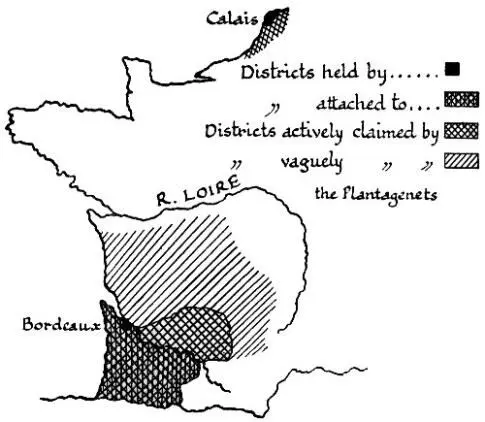The result of this breach in the negotiations was that Edward, and his son the Black Prince, entered upon the renewal of the war with a vague claim to Aquitaine as a whole, with an active claim upon Guienne—that is, the territory just north of the Garonne—and a real hold upon Gascony; and still preserving at the back of the whole scheme of operations that half-earnest, half-theatrical plan for an Anglo-French monarchy under the house of Plantagenet which had been formulated twenty-five years before.

It must be clearly grasped by the general reader how natural was both the real and the fantastic side of that pursuit. It involved no question of nationality as we should now understand it. It was based upon still living traditions of feudal connections which were personal and not racial; the chivalry of France and England was a French-speaking society based upon common ideals and fed with common memories. Gascony was in favour of the Plantagenets. Further, Guienne—the district north of Gascony beyond the Garonne—was Edward’s feudal own. He was not king of it, but he was feudal lord of it, and had done homage for it in 1331 to the Valois. It was not a new or distant tie. For the rest of the quarrel my first section in the essay on Crécy already alluded to must suffice, but for the link with Gascony a more particular emphasis is needed. The trade of Bordeaux, its great town, was principally with British ports. Its export of wine was a trade with Britain. It lay far from the centre of the French monarchy. It had counted in its Basque population an element indifferent for hundreds of years to the national unity of Gaul. The moneyed interests of its great commercial centres, of the western ones, at least (which were by far the richest), were closely bound up with England, with English trade. Add to this his actual feudal tenure of Guienne, and we can see how the feeling that all the south-west corner of France was his grew to be a very real feeling in Edward’s mind, and was shared by his son.
When, therefore, upon the 20th September 1355, Edward, the Black Prince, landed at Bordeaux, it was to find a province the nobles of which were honestly attached to his cause and the greater townsmen as well; while in the mass of the people there was no disaffection to the idea of this one out of the vague, many, French-speaking feudal lords whom they knew to be their masters, being the actual governor of the land. There was no conquest, nor any need for it, so far as Gascony was concerned; and in any expedition the Prince might make he was as certain of a regular following from the towns and estates that lay between the mountains and the Garonne as the King of France was certain of his own feudal levies in the north. But expeditions and fighting there would be because the Black Prince came with a commission not only to govern Gascony, but to establish himself in the more doubtful Guienne, and even to be—if he could conquer it—the lieutenant of his father, Edward, in all Aquitaine. He was to recover the districts immediately north of the Garonne, and even (in theory, at least) right up to the neighbourhood of the Loire; and (in theory, again) he was to regard those who might resist his administration of all these “lost” countries of the Central and Southern West of France as “rebels.”
It was thought certain at first, of course, that the whole claim could never be pushed home; but the Black Prince might well hope so to harry the districts which were claimed—and the neighbouring county of Toulouse to the east, which was admittedly feudatory to the King of Paris—as to compel that sovereign to recognise at last his father’s absolute sovereignty over Gascony certainly, and perhaps over Guienne, or even somewhat more than Guienne.
The remainder of that year, 1355, therefore—the autumn and the winter—were spent in striking at the sole portion of Gascony that was disaffected (that of Armagnac), and pushing eastward to ravage Toulouse and Carcassonne; for though these towns were admittedly outside Edward’s land, the wasting of their territory was a depletion of the King of France’s revenue.
The Black Prince did more. In the early part of the next year, 1356, he set up his flag upon Perigueux, some days’ march to the north of his father’s real boundary; and, as the year proceeded, he planned an advance far to the northward of that, which advance was to be taken in co-operation with a descent of the Plantagenet forces upon the other extremity of the French kingdom.
As to the character of the Black Prince, which so largely determined what is to follow, and especially his character in command, nothing is more conspicuous in the history of the Middle Ages. He was, partly from the influence of models, partly from personal force, the mirror of what the fighting, French-speaking nobility of that century took for its ideal conception of a captain. Far the first thing for him was the trade and the profession of arms, and the appetite for combat which this career satisfied certainly in its baser, but still more certainly in its nobler, effects in the mind of a virile youth. He had gone through the great experience of Crécy as a boy of sixteen. He was now, upon the eve of the Campaign of Poitiers, a man in his twenty-sixth year, thoroughly avid not only of honour but of capture, thoroughly contemptuous of gain, generous with a mad magnificence, always in debt, and always utterly careless of it. His courage was of the sort that takes a sharp delight in danger, and particularly in danger accompanied by strong action; he was an intense and a variable lover of women, an unwearied rider, of some (but no conspicuous) ability in the planning of an action or the grasp of a field, not cruel as yet (but already violent to an excess which later years, alas! refined into cruelty), splendidly adventurous, and strung every way for command. He could and did inspire a force, especially a small force, in the fashion which it was his chief desire to achieve. He was a great soldier; but his sins doomed him to an unhappy failure and to the wasting of his life at last.
Table of Contents
As the first of the great raids, that of Crécy, had been designed to draw off the pressure from Edward III.’s troops in the South of France, and to bring the French levies northward away from them, so the second great raid ten years later, which may be called by courtesy the “Campaign” of Poitiers, was designed to call pressure off the English troops in the north and to bring the French levies down southward away from them. As Edward’s march through Normandy had been a daring ride for booty, so was the Black Prince’s ride northward from Aquitaine; and as Edward from the neighbourhood of Paris turned and retreated at top speed from before the French host, so did the Black Prince turn from the neighbourhood of the Loire and retreat at speed from before the pursuit of the bodies which the King of France had gathered. And as the one great raid ended in the signal victory of Crécy, so did the other end in the signal victory of Poitiers.
But these parallel and typical actions, lying ten years apart, have, of course, one main point of resemblance more important than all the rest: each includes the complete overthrow of a large body of feudal cavalry by the trained forces of the Plantagenets; Crécy wholly, Poitiers partly, by the excellence of a missile weapon—the long-bow. Each shows also a striking disproportion of numbers: the little force on the defensive completely defeating the much larger body of the attack.
Those of my readers, therefore, who have made themselves acquainted with the details of Crécy must expect a repetition of much the same sort of incidents in the details of Poitiers. The two battles are twin, and stand out conspicuously in their sharpness of result from the mass of contemporary mediæval warfare.
Читать дальше













